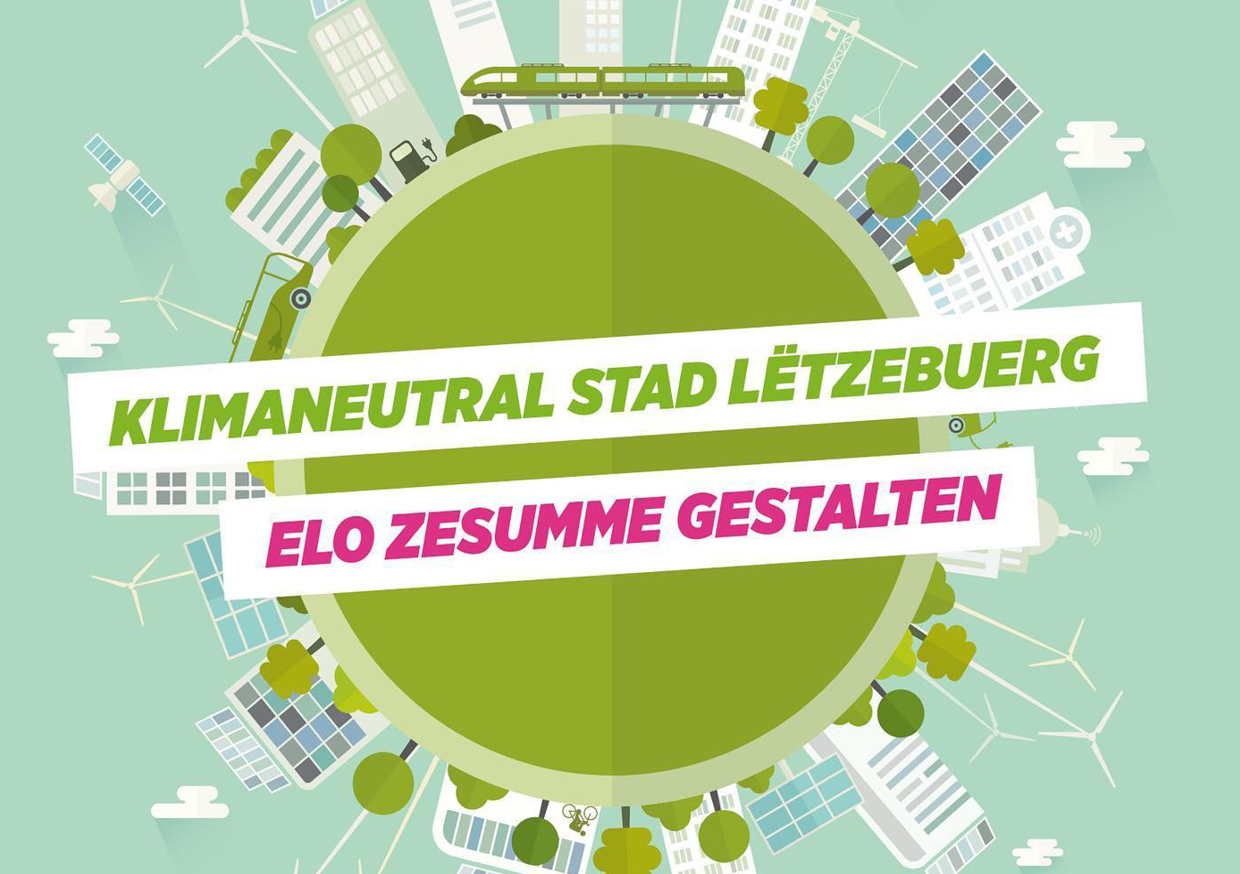Climate Neutral City of Lëtzebuerg: Shaping the city of tomorrow now
- Climate-friendly construction: More green in urban spaces
- Energy efficiency and renewable energies: A solar system for every roof
- Circular economy: A collaborative and waste-free city
- Mobility: A better quality of life through an interconnected bicycle network
- Together instead of top-down: Serious involvement of citizens
- The General Development Plan (PAG) and the Building Ordinance must be fundamentally revised to meet the challenges of climate protection and climate adaptation. Instead of rock gardens and waterproofing, we need greening and water permeability.
- A climate adaptation strategy for the city of Luxembourg that helps to mitigate the unavoidable consequences of climate change for citizens. This includes the systematic greening of urban space, roofs and facades and the expansion of green spaces in order to be better prepared for extreme heat, drought but also heavy rain, as well as a revision of wastewater management (rainwater utilisation, separation system…).
2. Mobility: A better quality of life through an interconnected bicycle network
- An expansion of pedestrian, bicycle and shared space zones in the city centre, in the centres of neighbourhoods and especially in front of schools.
- A safe Stater Vëlosreseau: connect the main cycle routes, link the neighbourhoods to these routes and consistently focus on soft mobility in the individual neighbourhoods.
- An expansion of the tram network, and giving priority to bus transport over motorised private transport.
- An expansion of car sharing, and the establishment of additional stations for the bicycle rental system, including the provision of rental cargo bikes.
- A revision of the parking system, including residents’ parking in neighbourhoods, with the aim of reducing traffic.
- The expansion of public electric charging stations.
In terms of renewable energies and energy efficiency, Luxembourg City is far below its potential, as can be clearly seen from the photovoltaic energy case: only around 221 kWp of photovoltaic capacity are currently installed on Luxembourg City buildings. According to our calculations, the total potential is around 10,000 kWp. Currently, the city is only using 2% of this total potential. If this potential were exploited, 2,250 households (9,000 people) could be supplied with green electricity. In addition, there is great potential on private roofs.
The energy refurbishment of the 800 municipal buildings and the electrification of vehicles are also only progressing at a snail’s pace. Furthermore, heating with climate-damaging natural gas or heating oil is not being challenged. That is why we are calling for:
- Solar panels belong on every new urban and private roof with high potential. Solar systems must be retrofitted on all roofs of city-owned buildings.
- A concrete timetable should be drawn up by when all buildings owned by the City of Luxembourg must be renovated in terms of energy efficiency and the vehicle fleet must be emission-free.
- The use of climate-damaging natural gas, which is used for heating in the majority of Luxembourg City, is to be reduced through a clear phase-out strategy (heat pumps, heat networks…).
- In addition to state support, the City of Luxembourg must provide financial support to citizens for the installation of private solar systems and zero-emission heating systems.
4. Circular economy: a collaborative and waste-free city
Climate, environmental and resource protection go hand in hand. Therefore, the circular economy, sharing and second-hand must be promoted. Luxembourg City also produces a disproportionate amount of residual waste and thus wastes considerable resources. That is why we are calling for:
- In addition to resource centres in residential neighbourhoods, repair workshops should be created where people can work and borrow tools. Co-working spaces for start-ups, pop-up stores for second-hand shops etc. should also be created.
- Regional, organic food in the city’s canteens and an upgrading of vegetarian and vegan options.
- A reform of the waste fee: it should be calculated according to emptying or weight. In this way, citizens who avoid or reduce waste will be rewarded.
- A zero-waste strategy for the city of Luxembourg includes the avoidance of waste at all levels of the city and the provision of reusable materials to support green events.
5. Together instead of top-down: serious involvement of citizens
A climate-neutral city can only be created together. In order for profound changes such as the transition to a climate-neutral city to become a reality, the measures must be developed and implemented together with citizens, associations and all relevant groups. We demand:
- Broad citizen participation so that all relevant actors can participate in the implementation of the climate protection measures and take responsibility. The concrete measures for climate protection in the city of Luxembourg should be advanced in dialogue with the public, experts, the administration and politics.
- To create a contact point with transversal competences, where citizens can inform themselves about and contribute to all climate-relevant topics.
Climate Neutral City of Lëtzebuerg: Shaping the city of tomorrow now
Cities are the central element of the global ecosystem. If we want to tackle the climate crisis, urban centres must reinvent themselves. Cities have the opportunity and the responsibility to massively reduce their emissions with all the measures that are already technically feasible today. Instead of treading water, the City of Luxembourg must set itself the goal of climate neutrality and give itself the necessary means to achieve it with its citizens, administrations and businesses in the next 10-20 years.
déi gréng Stad Lëtzebuerg have already submitted a motion to declare a climate emergency on 13 December 2019, based on the Climate Alliance template. Although the city is a member of the Climate Alliance, the motion has not been discussed to date.
If we want to stop the global climate crisis, we have to act locally – and right now!






